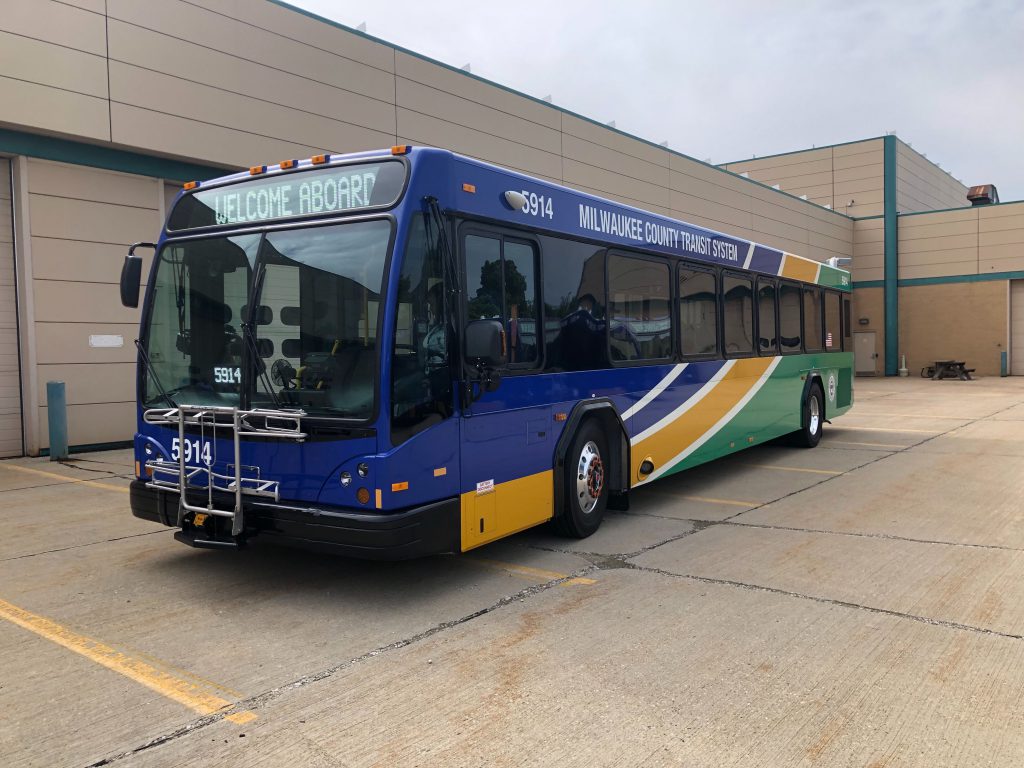Task Force Makes Recommendations for Security on Buses
Should security officers work for county or the transit system? Report doesn't take a stand.

A Milwaukee County Transit System (MCTS) bus from Gillig. Photo by Jeramey Jannene.
A task force created to find solutions for improved transit has assembled a menu of policy recommendations for Milwaukee County policymakers.
The document headed toward the board includes a handful of recommendations regarding security on buses run by the Milwaukee County Transit System (MCTS), including four potential replacements for the current security force provided by the private contractor Allied Universal.
The task force has been scrambling these past months to develop a recommendation for county policymakers in time for the 2024 budget process. The group closed out its work at its seventh meeting Monday with a slate of policy recommendations that will go now to the Milwaukee County Board.
The task force was created through an amendment to the 2023 budget, sponsored by Sup. Juan Miguel Martinez. Since it began it has included two supervisors, Peter Burgelis and Ryan Clancy, a rotating representative of MCTS, the Safety Security and Training Manager for the Milwaukee County Park Rangers, Todd Pisarski, and Michael Brown, vice-president of Amalgamated Transit Union Local 998.
The final product is a result of the task force wrapping up its work without coming to a singular policy recommendation, or even a consensus on what exactly is the correct path forward.
The major recommendations heading to the board are four possible iterations of a new transit security force comprised of personnel who are not sworn law enforcement. The options come with a range of costs loosely estimated by members of the task force, from $2.9 million to $4.1 million.
The major difference between the security force configurations is whether they are county employees or MCTS employees.
County employees would answer directly to the county administration and be modeled on the Park Rangers. MCTS employees would directly answer to the transit system administration. Neither would have arrest powers nor the ability to detain someone and would, in effect, have the same authority as the current security provided by Allied Universal.
The county’s most recent contract with Allied Universal was for approximately $2.7 million a year, which provides the transit system with fewer transit security officers than envisioned in the task force recommendations.
Sup. Clancy and Vice-President Brown have pushed for making the new security force county employees. Clancy has expressed a desire for the county board to have oversight and policymaking authority for the new security force and Brown has expressed a distrust in MCTS administration and its management of security.
MCTS, on the other hand, favors keeping transit security within the control of the transit system, with officials citing the unique nature of security in a transit and transportation context and arguing for keeping transit security personnel accountable to transit officials managing the system on a daily basis.
With the passage of 2023 Wisconsin Act 12, it will now require a supermajority of the board to create a new transit security force, as it will require new program spending and, if they are county employees, the creation of new county government positions.
Both policy versions have a 41-officer iteration and a 51-officer iteration, and all four also propose creating four shift supervisors, one public safety manager, one Department of Health and Human Services (DHHS) liaison and one Housing Division liaison. In both cases, it’s estimated the MCTS employees would be more expensive because they would be paid more than the current salary for the county’s park rangers.
Sup. Burgelis managed to include a final policy in the task force recommendation. It asks MCTS to work with the Milwaukee County Department of Transportation and DHHS to develop a transit security pilot program on two or three routes in order to create a list of tested strategies and policies that can be assessed for implementation across the whole system.
There are also five policy recommendations that can be implemented without a budget or for little money. These include improving the visibility and profile of security vehicles and uniforms; providing bus operators with a copy of an incident report within 48 hours of their filing one; “clear and consistent guidance” for how a bus operator would handle a passenger that is sleeping on the bus through the end of the route in a way that meets “both passenger and operator needs”; that safety and security policies, when applicable, also consider the need of people experiencing homelessness; and that there be a member of the security force assigned to MCTS dispatch.
If you think stories like this are important, become a member of Urban Milwaukee and help support real, independent journalism. Plus you get some cool added benefits.
Political Contributions Tracker
Displaying political contributions between people mentioned in this story. Learn more.
MKE County
-
J.D. Vance Plays Up Working Class Roots, Populist Politics in RNC Speech
 Jul 17th, 2024 by Graham Kilmer
Jul 17th, 2024 by Graham Kilmer
-
Ron Johnson Says Free-Market Principles Could Fix Education
 Jul 17th, 2024 by Graham Kilmer
Jul 17th, 2024 by Graham Kilmer
-
RNC Will Cause Some County Services To Be Moved to Wauwatosa
 Jul 12th, 2024 by Graham Kilmer
Jul 12th, 2024 by Graham Kilmer
Transportation
-
MCTS Adds 28 New Buses
 Jul 13th, 2024 by Graham Kilmer
Jul 13th, 2024 by Graham Kilmer
-
MCTS Designing New Bus Shelters
 Jul 10th, 2024 by Graham Kilmer
Jul 10th, 2024 by Graham Kilmer
-
MCTS Updates RNC Bus Detours To Better Serve Downtown, Riders
 Jul 9th, 2024 by Jeramey Jannene
Jul 9th, 2024 by Jeramey Jannene






















While there are many factors to consider, an important one is the
amount of time, steps and people involved per incident.
If security employees work for the county, that locks in certain
interagency steps that may add delays and not be necessary.
Transparency and good oversight are the keys.